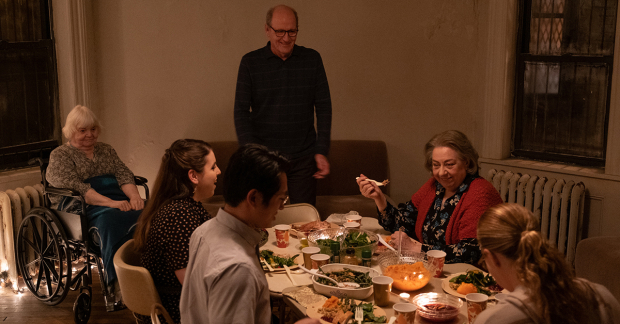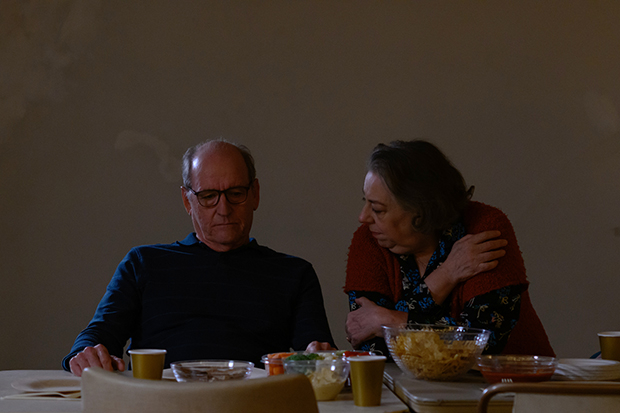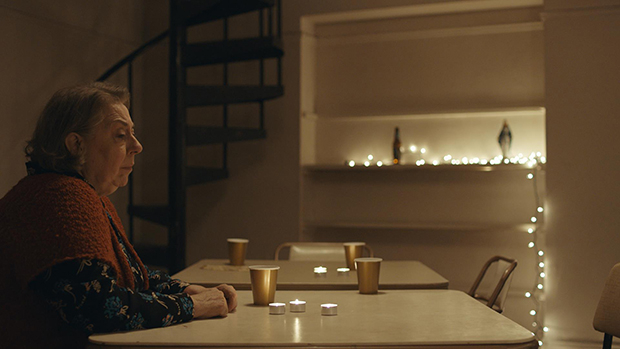Interview: Jayne Houdyshell and Stephen Karam on Rebuilding The Humans for the Big Screen
Houdyshell reprises her Tony-winning turn in the film adaptation of Karam’s Tony-winning play.
What a journey Jayne Houdyshell and Stephen Karam have been on. The Humans, Karam's Thanksgiving-set drama about an ordinary American family, took them from Roundabout Theatre Company's Laura Pels Theatre, to two different Broadway houses (the Hayes and the Schoenfeld), to Tony Awards (where Karam picked up Best Play and Houdyshell took home Best Featured Actress), to Center Theater Group in Los Angeles, and, finally, to the Hampstead Theatre in London.
It's been a long, career-changing trip, and now there's one more stop added: the screen. Houdyshell reprises her turn as family matriarch Deirdre Blake in Karam's cinematic adaptation (his directorial debut), which premieres on Showtime and in theaters on November 24 (Thanksgiving Eve). Here, they look over their experiences and how they played into rebuilding the world for film.

(courtesy of A24)
This conversation has been condensed and edited for clarity.
Jayne, you've been part of this family for so long, and all of that time you worked with the same group of actors. What was it like, then, to be come back to the character with a whole different set of humans, in a whole different medium?
Jayne Houdyshell: I think it would have been really jarring had it happened right on the heels of the show closing. But there was a year between closing The Humans onstage and moving The Humans onto a soundstage, so I had time to wrap my head around that. But I didn't know what to expect and what my experience was going to be. I was nervous because all of the actors in the film are people whose work I admire very much, and they have significant film and television credits and I do not. So, I thought, "Boy, this is going to be a crazy adjustment for me." I was very nervous.
But I was put at ease almost immediately. I met Richard Jenkins first and we just kind of became pals almost instantaneously. We sat down with Stephen to talk about the play and I loved the questions Richard was asking. He made me think about things that I had never thought about before, so I realized this was going to be really cool and interesting and challenging and fun in all the right ways. A couple of days later, I met everybody else and they were so delightful and jazzed and eager and curious, and they had such respect for the screenplay. I was immediately comforted by being with this group of actors.
Stephen, tell me about creating your adaptation and the difficulty that comes with building something that was already so successful for you.
Stephen Karam: One of the reasons I feel like I was able to even start the adaptation is that it really felt like I was doing something new. I was so madly in love with the Broadway company and the Broadway experience, and the only reason I pursued this is because I realized that the soul of the thing was going to be different. I felt a freedom in that, in letting go of dialogue. I know it sounds silly because it is, of course, an adaptation of the Broadway play, and I hope that in many ways it feels very faithful. But I do think that if I had been too beholden to the indelible experience we had on Broadway, I would have been paralyzed.

(courtesy of A24)
How much of your work here as director was influenced by watching Joe Mantello build the Broadway version?
Stephen: It's been influenced by all the great directors I've worked with, including Joe. You're constantly learning from watching other great directors work. But I don't think I would have started it if I was thinking about "Will I re-create the blocking?" That's the joy of a new apartment, a new space, of Jayne being the only hold over. It forces me to really inhabit that newness. You can't tell Richard Jenkins, "This actor did it this way in Chicago, and this actor did it this way on Broadway." You just have to let go of it.
There are ways in which film allowed me to tell aspects of the story that felt deeper and more specific. You can show the audience exactly where they have to be gazing, like the scene where Jayne and Richard help June Squibb into her wheelchair in the bathroom. That happens really quickly at the top of the play, but it allowed me to actually cut a whole swath of dialogue about what it's been like to take care of Momo, because you actually get to see it. You have a sense of how they interact in their marriage, the teamwork, the physical labor, the stress, and their somewhat good humor about it. You can get the sense how long they've been married based on their ability to even get kind of pissed off at each other.
Jayne, tell me about some of the discoveries that you made within your character that you perhaps hadn't made while working on the stage version?
Jayne: When we started shooting, everything was different for me. The physical world was different, so all of a sudden, there were no comparisons because it was just an entirely different experience. And I was very grateful for that, because I was able to be totally present, instead of comparing it to this other phenomenal thing that had happened in my life over the course of years.
The essence of who Deirdre was is very much… my perception of the role is based on my own mother. And it felt very personal and real to me because of that. So I maintained that there was no reason to change that. But I also knew that whoever Deirdre was in relationship to her family was incumbent on hearing Beanie Feldstein's Brigid, and Amy Schumer's Aimee, and Richard Jenkins's Erik, et cetera, et cetera. So what changed was what I heard and how I heard it, and that impacted my responses. But the person who was doing the responding was still the same Deirdre I discovered through years.

(courtesy of A24)
Not every actor gets to repeat their Tony-winning role onscreen, and not every playwright gets to adapt and direct the film adaptation of their Tony-winning play. What does this experience mean to both of you?
Jayne: It's interesting. If you had asked me that question before we shot it, I don't know what my answer would have been. But it would have been different than it is now, having gone through the shoot and now seeing it put out into the world. The difference is knowing that this incredible piece of writing is going to be seen by an audience that is so much bigger than an audience can be for a single production of a play. Now, hopefully over the years and decades, many thousands of people will see versions of The Humans onstage and the play will live on and on. But I love knowing that there is a movie of The Humans that exists for all time, and I feel very privileged to be part of it.
Stephen: I've had the experience with a previous adaptation — watching a play I wrote get turned into a movie and seeing a gay character getting turned straight, and a third of it getting rewritten. Sometimes along the way, you give up on the dream that something you created can get preserved in a way that's meaningful and truthful to you.
So I feel grateful and profoundly excited for a number of reasons, including that people who might not have had access to the Broadway production, or are on their way to discovering theater in their hometown, are able to have access to something like this. I remember seeing the movie version of Deathtrap as a kid and thinking, "Where can I get the script?" and I eventually tracked it down at the Drama Book Shop. Even questionable adaptations have that effect. It has deep meaning to me to be so proud of this cast and crew and creative team, because we did translate something via this genre that feels very right to me, and I can't ask for anything more.








